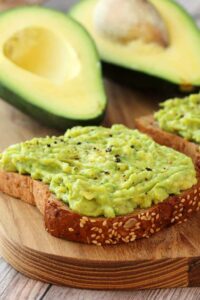By Danielle Maguire, Nutrition Program Director
 This month, we focus on our cardiovascular health! Heart disease is the leading cause of death for men and women in the United States. Only a few risk factors including age, gender, and family history cannot be controlled; but in most cases, heart disease is preventable with a healthy lifestyle and diet. Food choices have a big impact on your heart health!
This month, we focus on our cardiovascular health! Heart disease is the leading cause of death for men and women in the United States. Only a few risk factors including age, gender, and family history cannot be controlled; but in most cases, heart disease is preventable with a healthy lifestyle and diet. Food choices have a big impact on your heart health!
The two focuses on what to limit in a heart-healthy diet are salt and unhealthy fats.
Sodium
Too much sodium in your diet can lead to high blood pressure, heart disease, and stroke. It is recommended that adults limit their sodium intake to less than 2,300 mg per day (that’s equal to about 1 teaspoon of salt!). It’s easiest to reduce your salt intake by cooking at home. That way you can control the amount of added salt. You can cut out at least half the salt from most recipes, and utilize the “no salt added” or “reduced-sodium” items you’ve bought at the grocery store.
Fats
Many foods we eat contain fat. Some are better options than others, so the type that you eat plays an important role in your heart health. Healthy fats include unsaturated fats (omega-3 and omega-6). Foods that are rich in healthy fats include: nuts and seeds (and their butters/spreads), olives and avocados (and their oils), and fish like salmon and tuna.
Unhealthy fats include saturated fat and trans fat. Limit animal fats like butter and lard, vegetable shortening, coconut oil, and processed foods (baked goods, processed meat, and fried foods).
What you eat and do matters.
Show your heart some love by eating foods that will benefit your heart health! Eat a variety of nutrient-dense foods – more fruits, vegetables, whole grains, legumes, and fish. Show your heart some love by staying active with regular, moderate physical activity which can help lower your blood pressure, control stress, and manage your weight. Smoking also increases your risk for heart disease; show your heart some love by quitting.
What are some things you can do today to lower your risk of heart attack and stroke?
Sources: Heart Foundation, Academy of Nutrition and Dietetics, Food & Drug Administration
Avocado Toast
 Sometimes the simplest recipes are the best! This can be a great part of your breakfast or a snack. Avocados contain “healthy” fats and are high in fiber. When choosing an avocado at the grocery store, choose one that gives slightly when squeezed in the palm of your hand to know it’s ripe.
Sometimes the simplest recipes are the best! This can be a great part of your breakfast or a snack. Avocados contain “healthy” fats and are high in fiber. When choosing an avocado at the grocery store, choose one that gives slightly when squeezed in the palm of your hand to know it’s ripe.
Yield: 1 serving | Prep Time: 5 min
Ingredients:
- 2 slices whole grain bread
- 1 large avocado
- 1 tsp lemon juice (optional)
- Salt & Pepper to taste
Instructions:
- Toast 2 slices of whole grain bread.
- While the bread is toasting, slice the avocado in half, remove the seed, and scoop out the flesh into a bowl.
- Add lemon juice and mash avocado well with a fork.
- Add salt and pepper to taste.
- When the toast is ready, spread the mashed avocado generously onto each slice. Serve while toast is still hot. Enjoy!
Nutrition Facts: 271 calories, 9g protein, 13g fat, 9g fiber, 32g carbohydrate

